Leadership and Management for Service Industries
VerifiedAdded on 2023/01/11
|13
|4149
|42
AI Summary
This report explores the different classical management theories and their application in a service industry context. It also discusses the role of leaders and different leadership styles in the service sector. The report reviews management and leadership styles in a specific service sector organization and investigates the internal and external factors that influence management styles and structures. Additionally, it assesses the current management and leadership 'hard' and 'soft' skills in the service sector.
Contribute Materials
Your contribution can guide someone’s learning journey. Share your
documents today.
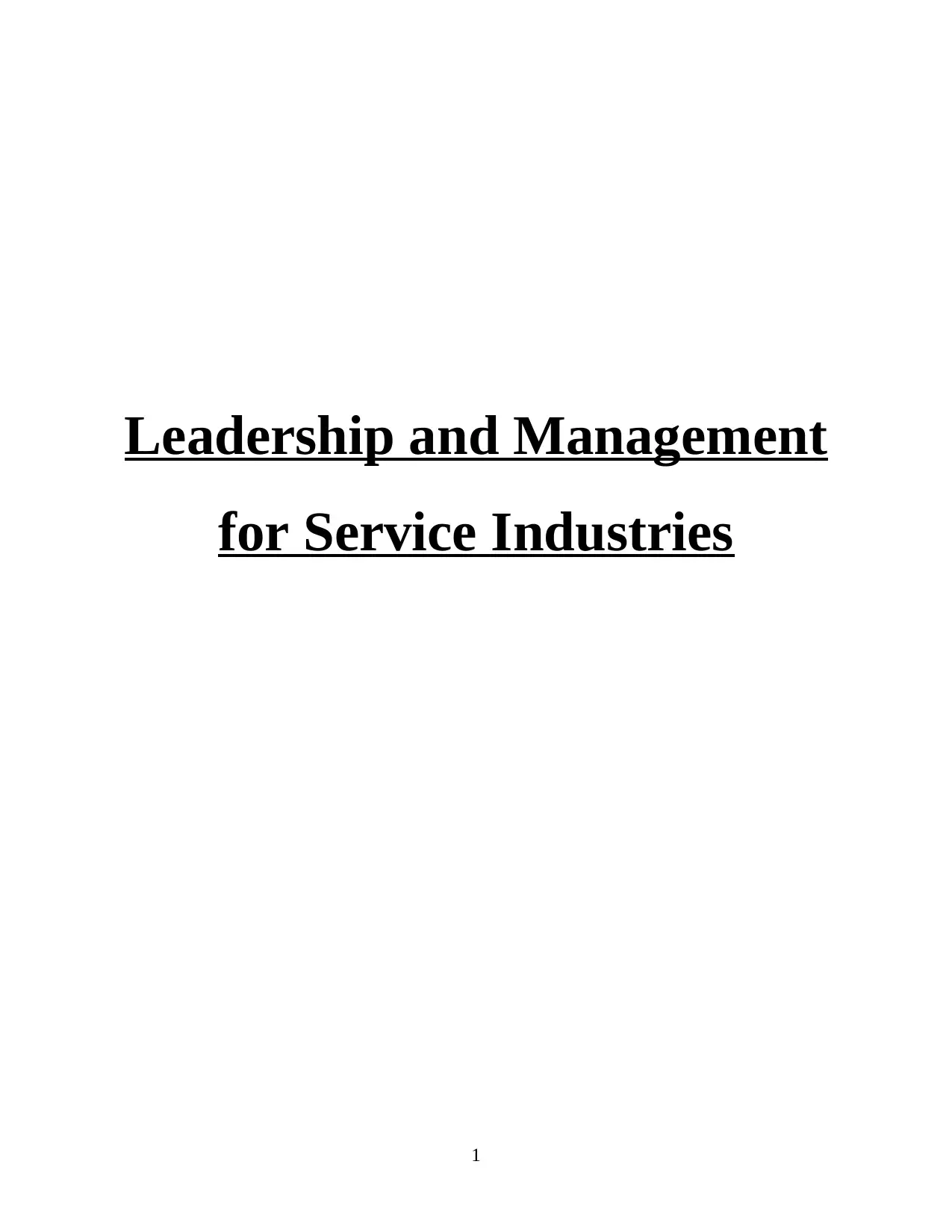
Leadership and Management
for Service Industries
1
for Service Industries
1
Secure Best Marks with AI Grader
Need help grading? Try our AI Grader for instant feedback on your assignments.
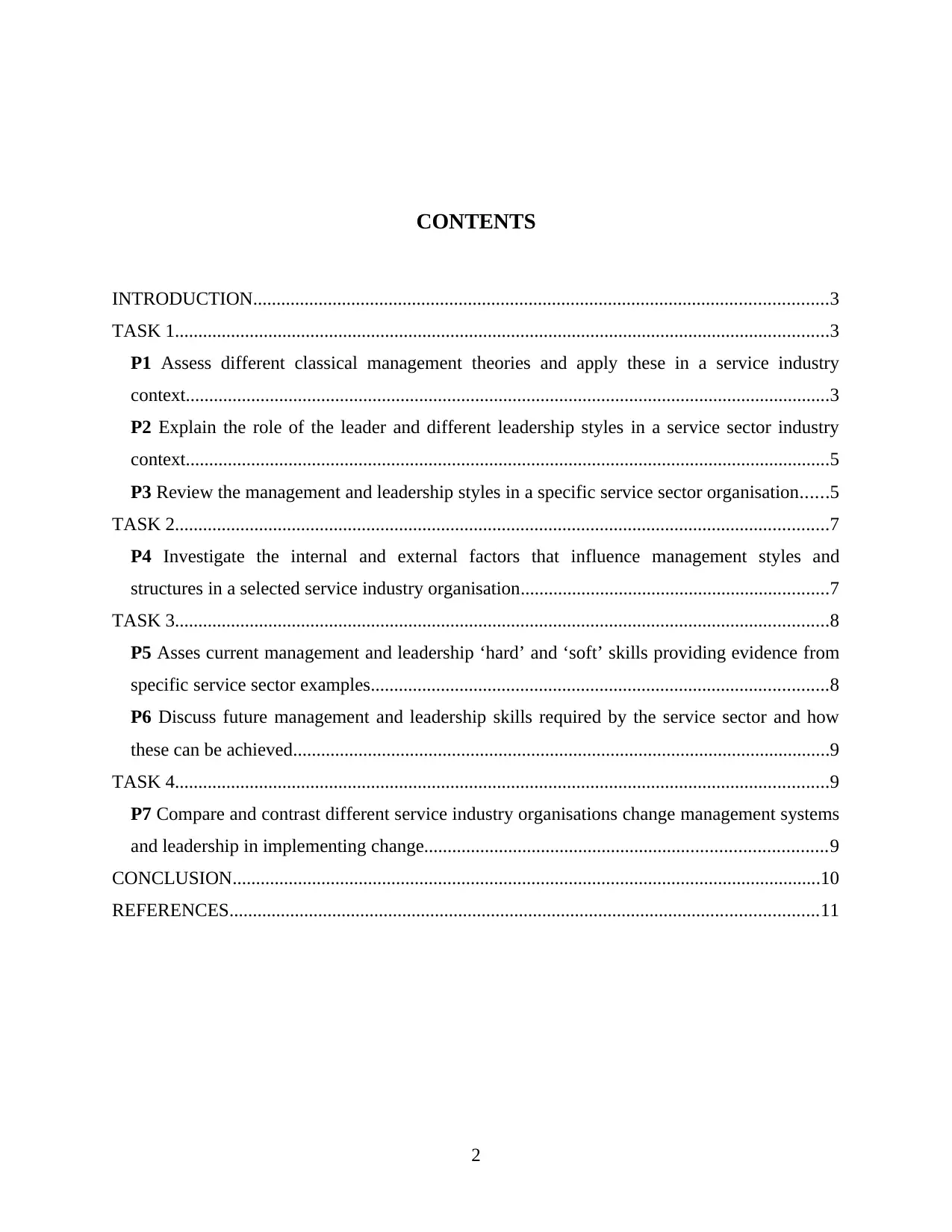
CONTENTS
INTRODUCTION...........................................................................................................................3
TASK 1............................................................................................................................................3
P1 Assess different classical management theories and apply these in a service industry
context..........................................................................................................................................3
P2 Explain the role of the leader and different leadership styles in a service sector industry
context..........................................................................................................................................5
P3 Review the management and leadership styles in a specific service sector organisation......5
TASK 2............................................................................................................................................7
P4 Investigate the internal and external factors that influence management styles and
structures in a selected service industry organisation..................................................................7
TASK 3............................................................................................................................................8
P5 Asses current management and leadership ‘hard’ and ‘soft’ skills providing evidence from
specific service sector examples..................................................................................................8
P6 Discuss future management and leadership skills required by the service sector and how
these can be achieved...................................................................................................................9
TASK 4............................................................................................................................................9
P7 Compare and contrast different service industry organisations change management systems
and leadership in implementing change......................................................................................9
CONCLUSION..............................................................................................................................10
REFERENCES..............................................................................................................................11
2
INTRODUCTION...........................................................................................................................3
TASK 1............................................................................................................................................3
P1 Assess different classical management theories and apply these in a service industry
context..........................................................................................................................................3
P2 Explain the role of the leader and different leadership styles in a service sector industry
context..........................................................................................................................................5
P3 Review the management and leadership styles in a specific service sector organisation......5
TASK 2............................................................................................................................................7
P4 Investigate the internal and external factors that influence management styles and
structures in a selected service industry organisation..................................................................7
TASK 3............................................................................................................................................8
P5 Asses current management and leadership ‘hard’ and ‘soft’ skills providing evidence from
specific service sector examples..................................................................................................8
P6 Discuss future management and leadership skills required by the service sector and how
these can be achieved...................................................................................................................9
TASK 4............................................................................................................................................9
P7 Compare and contrast different service industry organisations change management systems
and leadership in implementing change......................................................................................9
CONCLUSION..............................................................................................................................10
REFERENCES..............................................................................................................................11
2
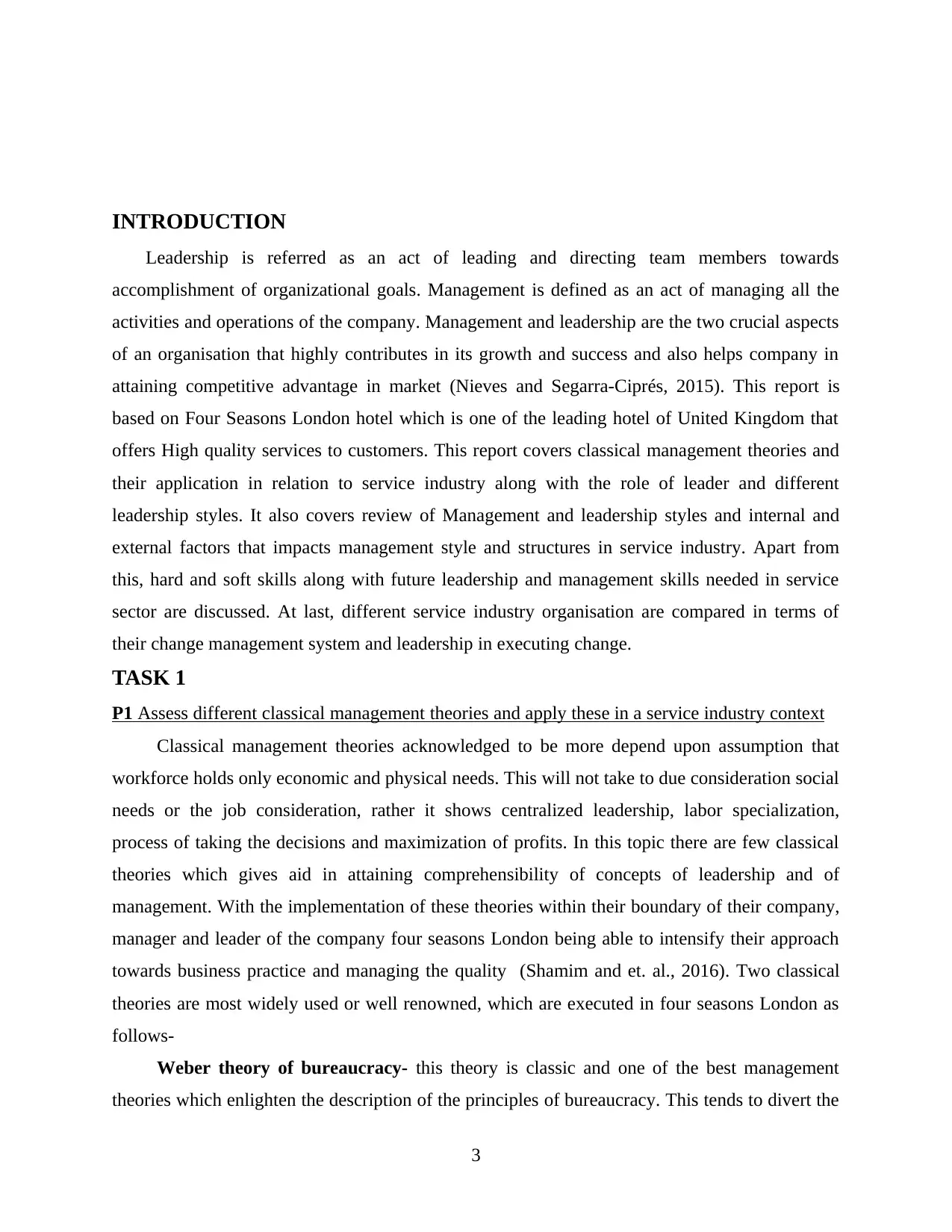
INTRODUCTION
Leadership is referred as an act of leading and directing team members towards
accomplishment of organizational goals. Management is defined as an act of managing all the
activities and operations of the company. Management and leadership are the two crucial aspects
of an organisation that highly contributes in its growth and success and also helps company in
attaining competitive advantage in market (Nieves and Segarra-Ciprés, 2015). This report is
based on Four Seasons London hotel which is one of the leading hotel of United Kingdom that
offers High quality services to customers. This report covers classical management theories and
their application in relation to service industry along with the role of leader and different
leadership styles. It also covers review of Management and leadership styles and internal and
external factors that impacts management style and structures in service industry. Apart from
this, hard and soft skills along with future leadership and management skills needed in service
sector are discussed. At last, different service industry organisation are compared in terms of
their change management system and leadership in executing change.
TASK 1
P1 Assess different classical management theories and apply these in a service industry context
Classical management theories acknowledged to be more depend upon assumption that
workforce holds only economic and physical needs. This will not take to due consideration social
needs or the job consideration, rather it shows centralized leadership, labor specialization,
process of taking the decisions and maximization of profits. In this topic there are few classical
theories which gives aid in attaining comprehensibility of concepts of leadership and of
management. With the implementation of these theories within their boundary of their company,
manager and leader of the company four seasons London being able to intensify their approach
towards business practice and managing the quality (Shamim and et. al., 2016). Two classical
theories are most widely used or well renowned, which are executed in four seasons London as
follows-
Weber theory of bureaucracy- this theory is classic and one of the best management
theories which enlighten the description of the principles of bureaucracy. This tends to divert the
3
Leadership is referred as an act of leading and directing team members towards
accomplishment of organizational goals. Management is defined as an act of managing all the
activities and operations of the company. Management and leadership are the two crucial aspects
of an organisation that highly contributes in its growth and success and also helps company in
attaining competitive advantage in market (Nieves and Segarra-Ciprés, 2015). This report is
based on Four Seasons London hotel which is one of the leading hotel of United Kingdom that
offers High quality services to customers. This report covers classical management theories and
their application in relation to service industry along with the role of leader and different
leadership styles. It also covers review of Management and leadership styles and internal and
external factors that impacts management style and structures in service industry. Apart from
this, hard and soft skills along with future leadership and management skills needed in service
sector are discussed. At last, different service industry organisation are compared in terms of
their change management system and leadership in executing change.
TASK 1
P1 Assess different classical management theories and apply these in a service industry context
Classical management theories acknowledged to be more depend upon assumption that
workforce holds only economic and physical needs. This will not take to due consideration social
needs or the job consideration, rather it shows centralized leadership, labor specialization,
process of taking the decisions and maximization of profits. In this topic there are few classical
theories which gives aid in attaining comprehensibility of concepts of leadership and of
management. With the implementation of these theories within their boundary of their company,
manager and leader of the company four seasons London being able to intensify their approach
towards business practice and managing the quality (Shamim and et. al., 2016). Two classical
theories are most widely used or well renowned, which are executed in four seasons London as
follows-
Weber theory of bureaucracy- this theory is classic and one of the best management
theories which enlighten the description of the principles of bureaucracy. This tends to divert the
3
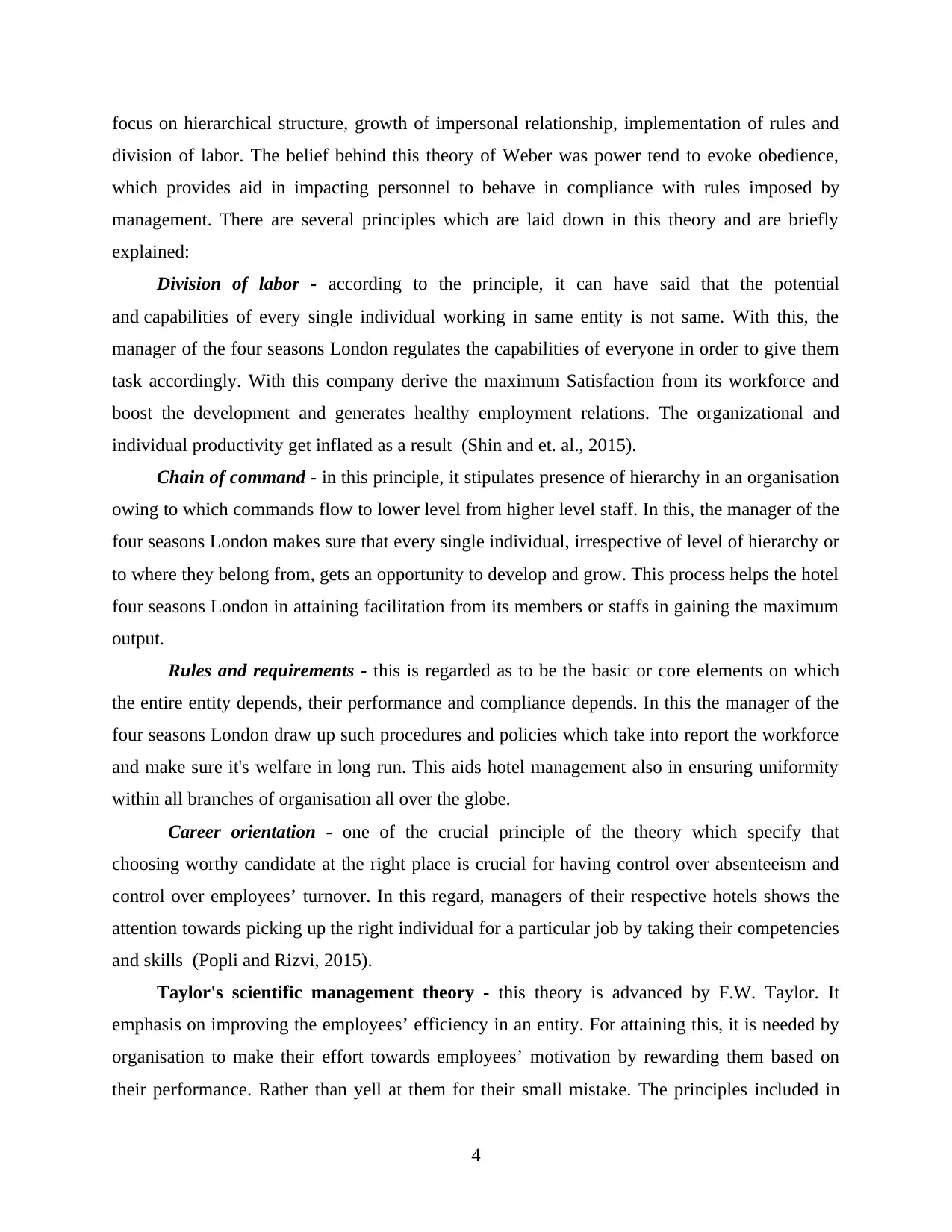
focus on hierarchical structure, growth of impersonal relationship, implementation of rules and
division of labor. The belief behind this theory of Weber was power tend to evoke obedience,
which provides aid in impacting personnel to behave in compliance with rules imposed by
management. There are several principles which are laid down in this theory and are briefly
explained:
Division of labor - according to the principle, it can have said that the potential
and capabilities of every single individual working in same entity is not same. With this, the
manager of the four seasons London regulates the capabilities of everyone in order to give them
task accordingly. With this company derive the maximum Satisfaction from its workforce and
boost the development and generates healthy employment relations. The organizational and
individual productivity get inflated as a result (Shin and et. al., 2015).
Chain of command - in this principle, it stipulates presence of hierarchy in an organisation
owing to which commands flow to lower level from higher level staff. In this, the manager of the
four seasons London makes sure that every single individual, irrespective of level of hierarchy or
to where they belong from, gets an opportunity to develop and grow. This process helps the hotel
four seasons London in attaining facilitation from its members or staffs in gaining the maximum
output.
Rules and requirements - this is regarded as to be the basic or core elements on which
the entire entity depends, their performance and compliance depends. In this the manager of the
four seasons London draw up such procedures and policies which take into report the workforce
and make sure it's welfare in long run. This aids hotel management also in ensuring uniformity
within all branches of organisation all over the globe.
Career orientation - one of the crucial principle of the theory which specify that
choosing worthy candidate at the right place is crucial for having control over absenteeism and
control over employees’ turnover. In this regard, managers of their respective hotels shows the
attention towards picking up the right individual for a particular job by taking their competencies
and skills (Popli and Rizvi, 2015).
Taylor's scientific management theory - this theory is advanced by F.W. Taylor. It
emphasis on improving the employees’ efficiency in an entity. For attaining this, it is needed by
organisation to make their effort towards employees’ motivation by rewarding them based on
their performance. Rather than yell at them for their small mistake. The principles included in
4
division of labor. The belief behind this theory of Weber was power tend to evoke obedience,
which provides aid in impacting personnel to behave in compliance with rules imposed by
management. There are several principles which are laid down in this theory and are briefly
explained:
Division of labor - according to the principle, it can have said that the potential
and capabilities of every single individual working in same entity is not same. With this, the
manager of the four seasons London regulates the capabilities of everyone in order to give them
task accordingly. With this company derive the maximum Satisfaction from its workforce and
boost the development and generates healthy employment relations. The organizational and
individual productivity get inflated as a result (Shin and et. al., 2015).
Chain of command - in this principle, it stipulates presence of hierarchy in an organisation
owing to which commands flow to lower level from higher level staff. In this, the manager of the
four seasons London makes sure that every single individual, irrespective of level of hierarchy or
to where they belong from, gets an opportunity to develop and grow. This process helps the hotel
four seasons London in attaining facilitation from its members or staffs in gaining the maximum
output.
Rules and requirements - this is regarded as to be the basic or core elements on which
the entire entity depends, their performance and compliance depends. In this the manager of the
four seasons London draw up such procedures and policies which take into report the workforce
and make sure it's welfare in long run. This aids hotel management also in ensuring uniformity
within all branches of organisation all over the globe.
Career orientation - one of the crucial principle of the theory which specify that
choosing worthy candidate at the right place is crucial for having control over absenteeism and
control over employees’ turnover. In this regard, managers of their respective hotels shows the
attention towards picking up the right individual for a particular job by taking their competencies
and skills (Popli and Rizvi, 2015).
Taylor's scientific management theory - this theory is advanced by F.W. Taylor. It
emphasis on improving the employees’ efficiency in an entity. For attaining this, it is needed by
organisation to make their effort towards employees’ motivation by rewarding them based on
their performance. Rather than yell at them for their small mistake. The principles included in
4
Secure Best Marks with AI Grader
Need help grading? Try our AI Grader for instant feedback on your assignments.
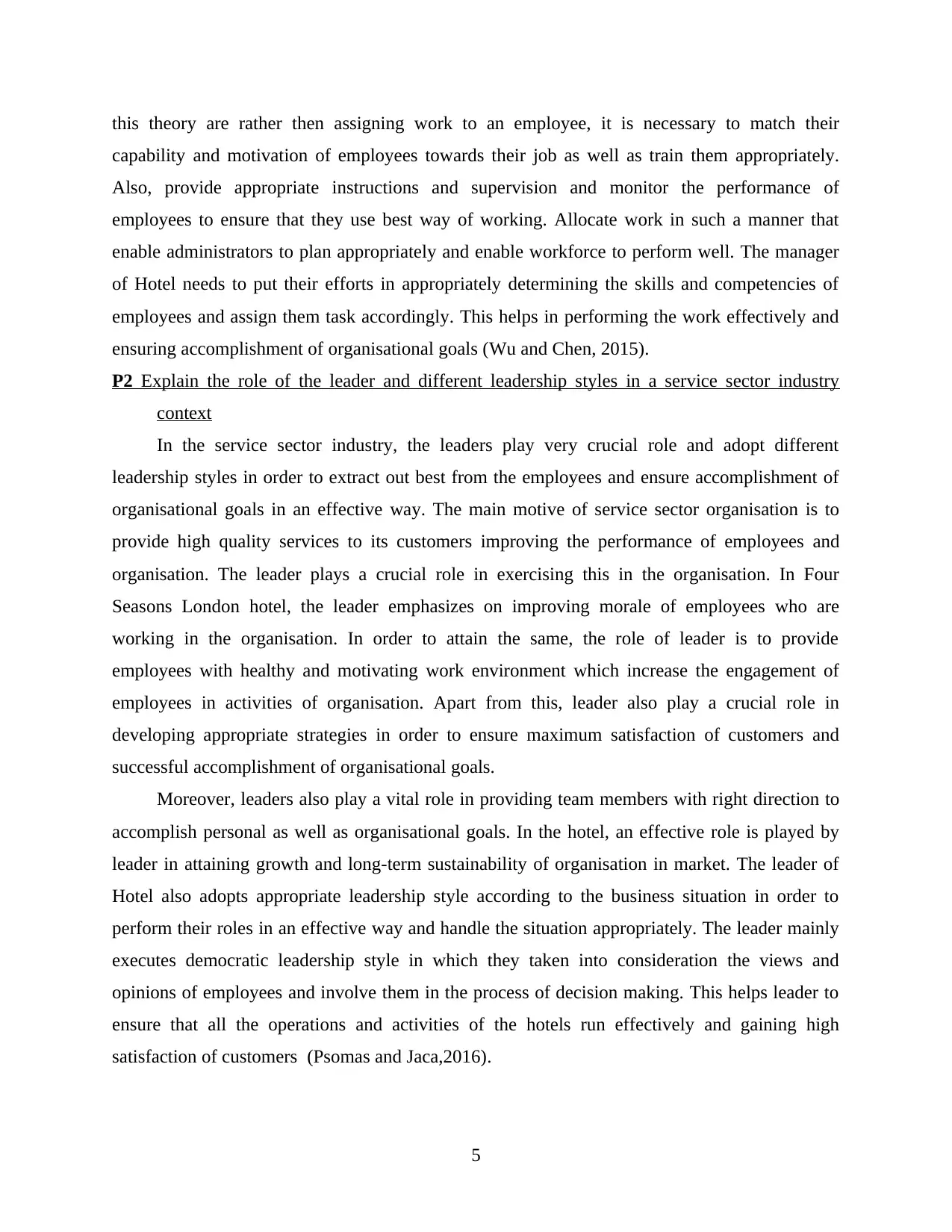
this theory are rather then assigning work to an employee, it is necessary to match their
capability and motivation of employees towards their job as well as train them appropriately.
Also, provide appropriate instructions and supervision and monitor the performance of
employees to ensure that they use best way of working. Allocate work in such a manner that
enable administrators to plan appropriately and enable workforce to perform well. The manager
of Hotel needs to put their efforts in appropriately determining the skills and competencies of
employees and assign them task accordingly. This helps in performing the work effectively and
ensuring accomplishment of organisational goals (Wu and Chen, 2015).
P2 Explain the role of the leader and different leadership styles in a service sector industry
context
In the service sector industry, the leaders play very crucial role and adopt different
leadership styles in order to extract out best from the employees and ensure accomplishment of
organisational goals in an effective way. The main motive of service sector organisation is to
provide high quality services to its customers improving the performance of employees and
organisation. The leader plays a crucial role in exercising this in the organisation. In Four
Seasons London hotel, the leader emphasizes on improving morale of employees who are
working in the organisation. In order to attain the same, the role of leader is to provide
employees with healthy and motivating work environment which increase the engagement of
employees in activities of organisation. Apart from this, leader also play a crucial role in
developing appropriate strategies in order to ensure maximum satisfaction of customers and
successful accomplishment of organisational goals.
Moreover, leaders also play a vital role in providing team members with right direction to
accomplish personal as well as organisational goals. In the hotel, an effective role is played by
leader in attaining growth and long-term sustainability of organisation in market. The leader of
Hotel also adopts appropriate leadership style according to the business situation in order to
perform their roles in an effective way and handle the situation appropriately. The leader mainly
executes democratic leadership style in which they taken into consideration the views and
opinions of employees and involve them in the process of decision making. This helps leader to
ensure that all the operations and activities of the hotels run effectively and gaining high
satisfaction of customers (Psomas and Jaca,2016).
5
capability and motivation of employees towards their job as well as train them appropriately.
Also, provide appropriate instructions and supervision and monitor the performance of
employees to ensure that they use best way of working. Allocate work in such a manner that
enable administrators to plan appropriately and enable workforce to perform well. The manager
of Hotel needs to put their efforts in appropriately determining the skills and competencies of
employees and assign them task accordingly. This helps in performing the work effectively and
ensuring accomplishment of organisational goals (Wu and Chen, 2015).
P2 Explain the role of the leader and different leadership styles in a service sector industry
context
In the service sector industry, the leaders play very crucial role and adopt different
leadership styles in order to extract out best from the employees and ensure accomplishment of
organisational goals in an effective way. The main motive of service sector organisation is to
provide high quality services to its customers improving the performance of employees and
organisation. The leader plays a crucial role in exercising this in the organisation. In Four
Seasons London hotel, the leader emphasizes on improving morale of employees who are
working in the organisation. In order to attain the same, the role of leader is to provide
employees with healthy and motivating work environment which increase the engagement of
employees in activities of organisation. Apart from this, leader also play a crucial role in
developing appropriate strategies in order to ensure maximum satisfaction of customers and
successful accomplishment of organisational goals.
Moreover, leaders also play a vital role in providing team members with right direction to
accomplish personal as well as organisational goals. In the hotel, an effective role is played by
leader in attaining growth and long-term sustainability of organisation in market. The leader of
Hotel also adopts appropriate leadership style according to the business situation in order to
perform their roles in an effective way and handle the situation appropriately. The leader mainly
executes democratic leadership style in which they taken into consideration the views and
opinions of employees and involve them in the process of decision making. This helps leader to
ensure that all the operations and activities of the hotels run effectively and gaining high
satisfaction of customers (Psomas and Jaca,2016).
5
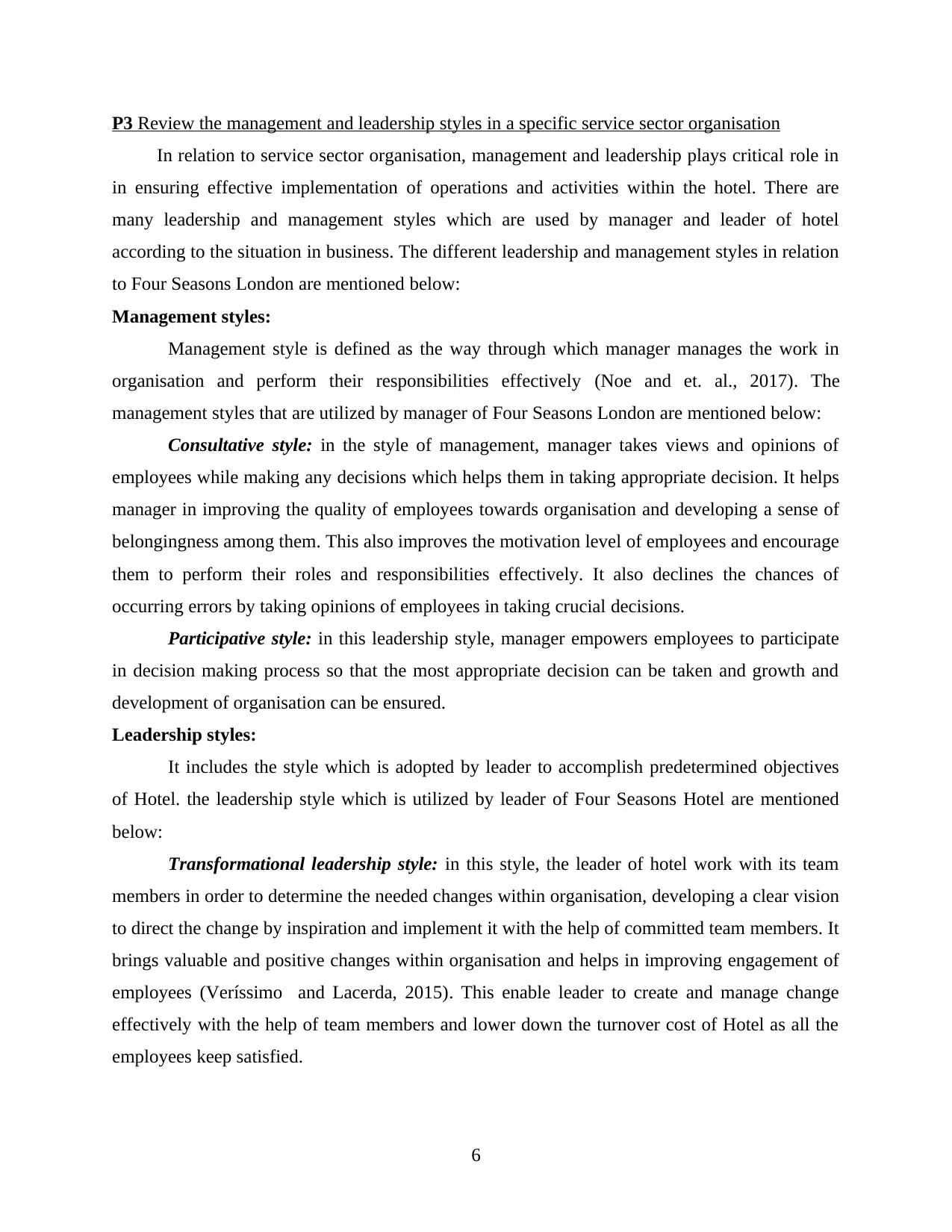
P3 Review the management and leadership styles in a specific service sector organisation
In relation to service sector organisation, management and leadership plays critical role in
in ensuring effective implementation of operations and activities within the hotel. There are
many leadership and management styles which are used by manager and leader of hotel
according to the situation in business. The different leadership and management styles in relation
to Four Seasons London are mentioned below:
Management styles:
Management style is defined as the way through which manager manages the work in
organisation and perform their responsibilities effectively (Noe and et. al., 2017). The
management styles that are utilized by manager of Four Seasons London are mentioned below:
Consultative style: in the style of management, manager takes views and opinions of
employees while making any decisions which helps them in taking appropriate decision. It helps
manager in improving the quality of employees towards organisation and developing a sense of
belongingness among them. This also improves the motivation level of employees and encourage
them to perform their roles and responsibilities effectively. It also declines the chances of
occurring errors by taking opinions of employees in taking crucial decisions.
Participative style: in this leadership style, manager empowers employees to participate
in decision making process so that the most appropriate decision can be taken and growth and
development of organisation can be ensured.
Leadership styles:
It includes the style which is adopted by leader to accomplish predetermined objectives
of Hotel. the leadership style which is utilized by leader of Four Seasons Hotel are mentioned
below:
Transformational leadership style: in this style, the leader of hotel work with its team
members in order to determine the needed changes within organisation, developing a clear vision
to direct the change by inspiration and implement it with the help of committed team members. It
brings valuable and positive changes within organisation and helps in improving engagement of
employees (Veríssimo and Lacerda, 2015). This enable leader to create and manage change
effectively with the help of team members and lower down the turnover cost of Hotel as all the
employees keep satisfied.
6
In relation to service sector organisation, management and leadership plays critical role in
in ensuring effective implementation of operations and activities within the hotel. There are
many leadership and management styles which are used by manager and leader of hotel
according to the situation in business. The different leadership and management styles in relation
to Four Seasons London are mentioned below:
Management styles:
Management style is defined as the way through which manager manages the work in
organisation and perform their responsibilities effectively (Noe and et. al., 2017). The
management styles that are utilized by manager of Four Seasons London are mentioned below:
Consultative style: in the style of management, manager takes views and opinions of
employees while making any decisions which helps them in taking appropriate decision. It helps
manager in improving the quality of employees towards organisation and developing a sense of
belongingness among them. This also improves the motivation level of employees and encourage
them to perform their roles and responsibilities effectively. It also declines the chances of
occurring errors by taking opinions of employees in taking crucial decisions.
Participative style: in this leadership style, manager empowers employees to participate
in decision making process so that the most appropriate decision can be taken and growth and
development of organisation can be ensured.
Leadership styles:
It includes the style which is adopted by leader to accomplish predetermined objectives
of Hotel. the leadership style which is utilized by leader of Four Seasons Hotel are mentioned
below:
Transformational leadership style: in this style, the leader of hotel work with its team
members in order to determine the needed changes within organisation, developing a clear vision
to direct the change by inspiration and implement it with the help of committed team members. It
brings valuable and positive changes within organisation and helps in improving engagement of
employees (Veríssimo and Lacerda, 2015). This enable leader to create and manage change
effectively with the help of team members and lower down the turnover cost of Hotel as all the
employees keep satisfied.
6
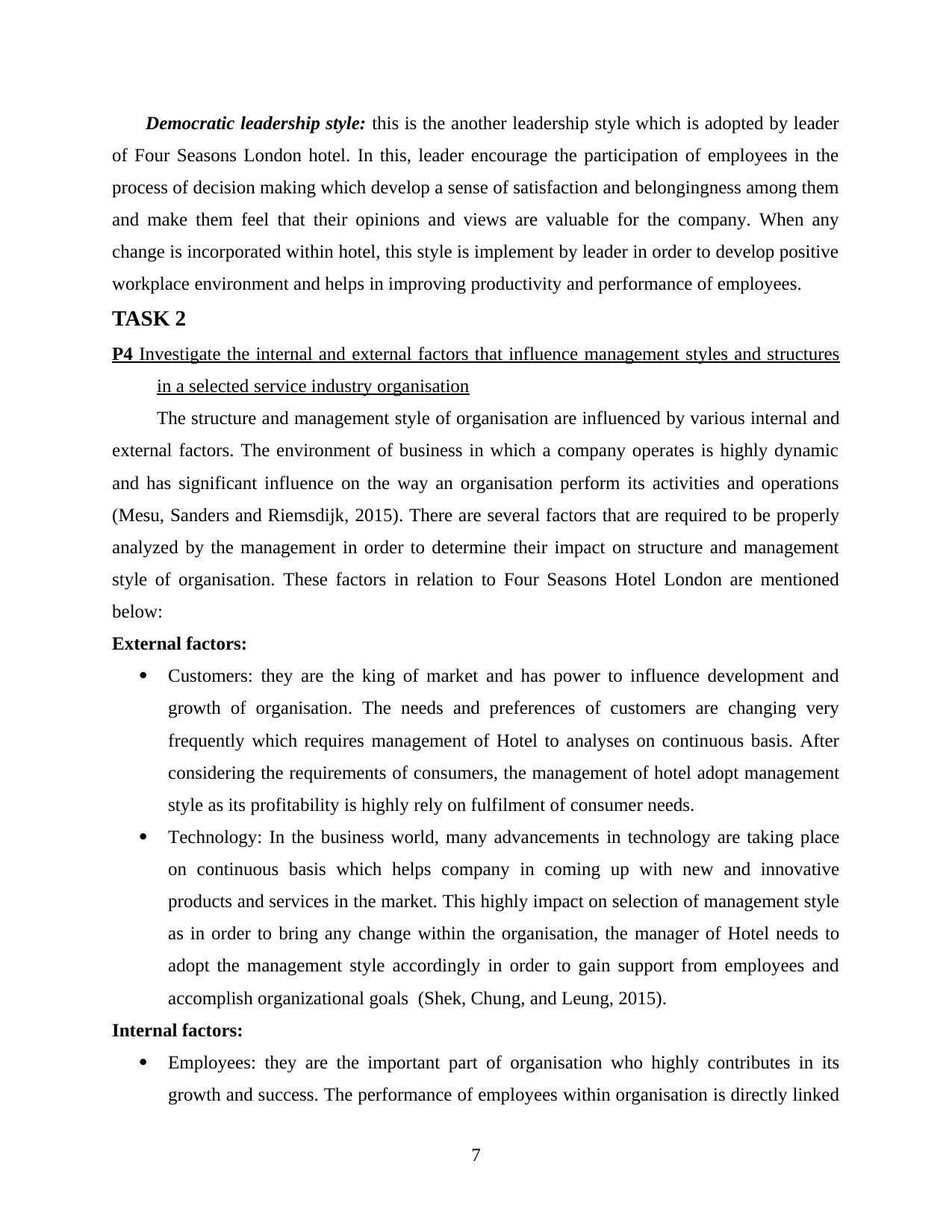
Democratic leadership style: this is the another leadership style which is adopted by leader
of Four Seasons London hotel. In this, leader encourage the participation of employees in the
process of decision making which develop a sense of satisfaction and belongingness among them
and make them feel that their opinions and views are valuable for the company. When any
change is incorporated within hotel, this style is implement by leader in order to develop positive
workplace environment and helps in improving productivity and performance of employees.
TASK 2
P4 Investigate the internal and external factors that influence management styles and structures
in a selected service industry organisation
The structure and management style of organisation are influenced by various internal and
external factors. The environment of business in which a company operates is highly dynamic
and has significant influence on the way an organisation perform its activities and operations
(Mesu, Sanders and Riemsdijk, 2015). There are several factors that are required to be properly
analyzed by the management in order to determine their impact on structure and management
style of organisation. These factors in relation to Four Seasons Hotel London are mentioned
below:
External factors:
Customers: they are the king of market and has power to influence development and
growth of organisation. The needs and preferences of customers are changing very
frequently which requires management of Hotel to analyses on continuous basis. After
considering the requirements of consumers, the management of hotel adopt management
style as its profitability is highly rely on fulfilment of consumer needs.
Technology: In the business world, many advancements in technology are taking place
on continuous basis which helps company in coming up with new and innovative
products and services in the market. This highly impact on selection of management style
as in order to bring any change within the organisation, the manager of Hotel needs to
adopt the management style accordingly in order to gain support from employees and
accomplish organizational goals (Shek, Chung, and Leung, 2015).
Internal factors:
Employees: they are the important part of organisation who highly contributes in its
growth and success. The performance of employees within organisation is directly linked
7
of Four Seasons London hotel. In this, leader encourage the participation of employees in the
process of decision making which develop a sense of satisfaction and belongingness among them
and make them feel that their opinions and views are valuable for the company. When any
change is incorporated within hotel, this style is implement by leader in order to develop positive
workplace environment and helps in improving productivity and performance of employees.
TASK 2
P4 Investigate the internal and external factors that influence management styles and structures
in a selected service industry organisation
The structure and management style of organisation are influenced by various internal and
external factors. The environment of business in which a company operates is highly dynamic
and has significant influence on the way an organisation perform its activities and operations
(Mesu, Sanders and Riemsdijk, 2015). There are several factors that are required to be properly
analyzed by the management in order to determine their impact on structure and management
style of organisation. These factors in relation to Four Seasons Hotel London are mentioned
below:
External factors:
Customers: they are the king of market and has power to influence development and
growth of organisation. The needs and preferences of customers are changing very
frequently which requires management of Hotel to analyses on continuous basis. After
considering the requirements of consumers, the management of hotel adopt management
style as its profitability is highly rely on fulfilment of consumer needs.
Technology: In the business world, many advancements in technology are taking place
on continuous basis which helps company in coming up with new and innovative
products and services in the market. This highly impact on selection of management style
as in order to bring any change within the organisation, the manager of Hotel needs to
adopt the management style accordingly in order to gain support from employees and
accomplish organizational goals (Shek, Chung, and Leung, 2015).
Internal factors:
Employees: they are the important part of organisation who highly contributes in its
growth and success. The performance of employees within organisation is directly linked
7
Paraphrase This Document
Need a fresh take? Get an instant paraphrase of this document with our AI Paraphraser
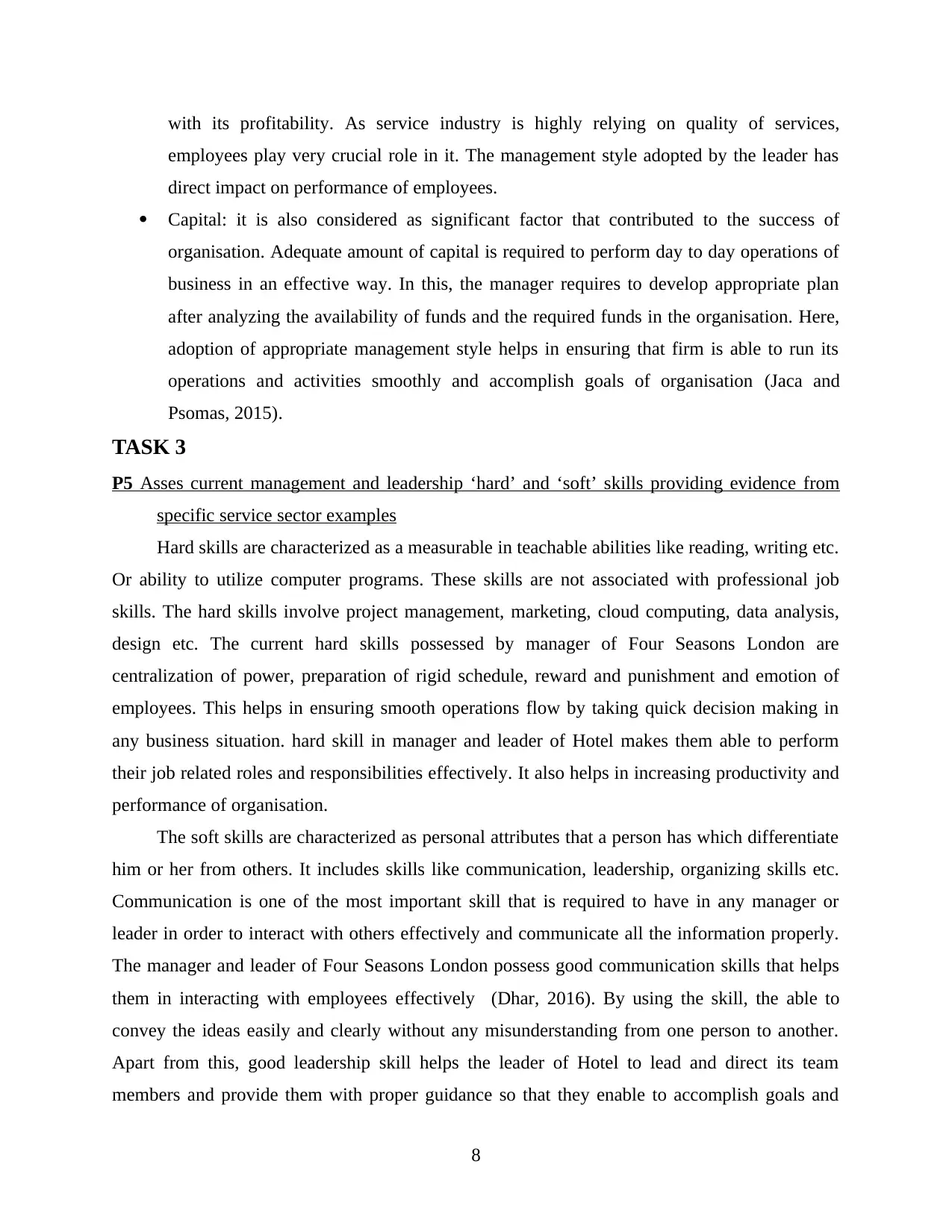
with its profitability. As service industry is highly relying on quality of services,
employees play very crucial role in it. The management style adopted by the leader has
direct impact on performance of employees.
Capital: it is also considered as significant factor that contributed to the success of
organisation. Adequate amount of capital is required to perform day to day operations of
business in an effective way. In this, the manager requires to develop appropriate plan
after analyzing the availability of funds and the required funds in the organisation. Here,
adoption of appropriate management style helps in ensuring that firm is able to run its
operations and activities smoothly and accomplish goals of organisation (Jaca and
Psomas, 2015).
TASK 3
P5 Asses current management and leadership ‘hard’ and ‘soft’ skills providing evidence from
specific service sector examples
Hard skills are characterized as a measurable in teachable abilities like reading, writing etc.
Or ability to utilize computer programs. These skills are not associated with professional job
skills. The hard skills involve project management, marketing, cloud computing, data analysis,
design etc. The current hard skills possessed by manager of Four Seasons London are
centralization of power, preparation of rigid schedule, reward and punishment and emotion of
employees. This helps in ensuring smooth operations flow by taking quick decision making in
any business situation. hard skill in manager and leader of Hotel makes them able to perform
their job related roles and responsibilities effectively. It also helps in increasing productivity and
performance of organisation.
The soft skills are characterized as personal attributes that a person has which differentiate
him or her from others. It includes skills like communication, leadership, organizing skills etc.
Communication is one of the most important skill that is required to have in any manager or
leader in order to interact with others effectively and communicate all the information properly.
The manager and leader of Four Seasons London possess good communication skills that helps
them in interacting with employees effectively (Dhar, 2016). By using the skill, the able to
convey the ideas easily and clearly without any misunderstanding from one person to another.
Apart from this, good leadership skill helps the leader of Hotel to lead and direct its team
members and provide them with proper guidance so that they enable to accomplish goals and
8
employees play very crucial role in it. The management style adopted by the leader has
direct impact on performance of employees.
Capital: it is also considered as significant factor that contributed to the success of
organisation. Adequate amount of capital is required to perform day to day operations of
business in an effective way. In this, the manager requires to develop appropriate plan
after analyzing the availability of funds and the required funds in the organisation. Here,
adoption of appropriate management style helps in ensuring that firm is able to run its
operations and activities smoothly and accomplish goals of organisation (Jaca and
Psomas, 2015).
TASK 3
P5 Asses current management and leadership ‘hard’ and ‘soft’ skills providing evidence from
specific service sector examples
Hard skills are characterized as a measurable in teachable abilities like reading, writing etc.
Or ability to utilize computer programs. These skills are not associated with professional job
skills. The hard skills involve project management, marketing, cloud computing, data analysis,
design etc. The current hard skills possessed by manager of Four Seasons London are
centralization of power, preparation of rigid schedule, reward and punishment and emotion of
employees. This helps in ensuring smooth operations flow by taking quick decision making in
any business situation. hard skill in manager and leader of Hotel makes them able to perform
their job related roles and responsibilities effectively. It also helps in increasing productivity and
performance of organisation.
The soft skills are characterized as personal attributes that a person has which differentiate
him or her from others. It includes skills like communication, leadership, organizing skills etc.
Communication is one of the most important skill that is required to have in any manager or
leader in order to interact with others effectively and communicate all the information properly.
The manager and leader of Four Seasons London possess good communication skills that helps
them in interacting with employees effectively (Dhar, 2016). By using the skill, the able to
convey the ideas easily and clearly without any misunderstanding from one person to another.
Apart from this, good leadership skill helps the leader of Hotel to lead and direct its team
members and provide them with proper guidance so that they enable to accomplish goals and
8
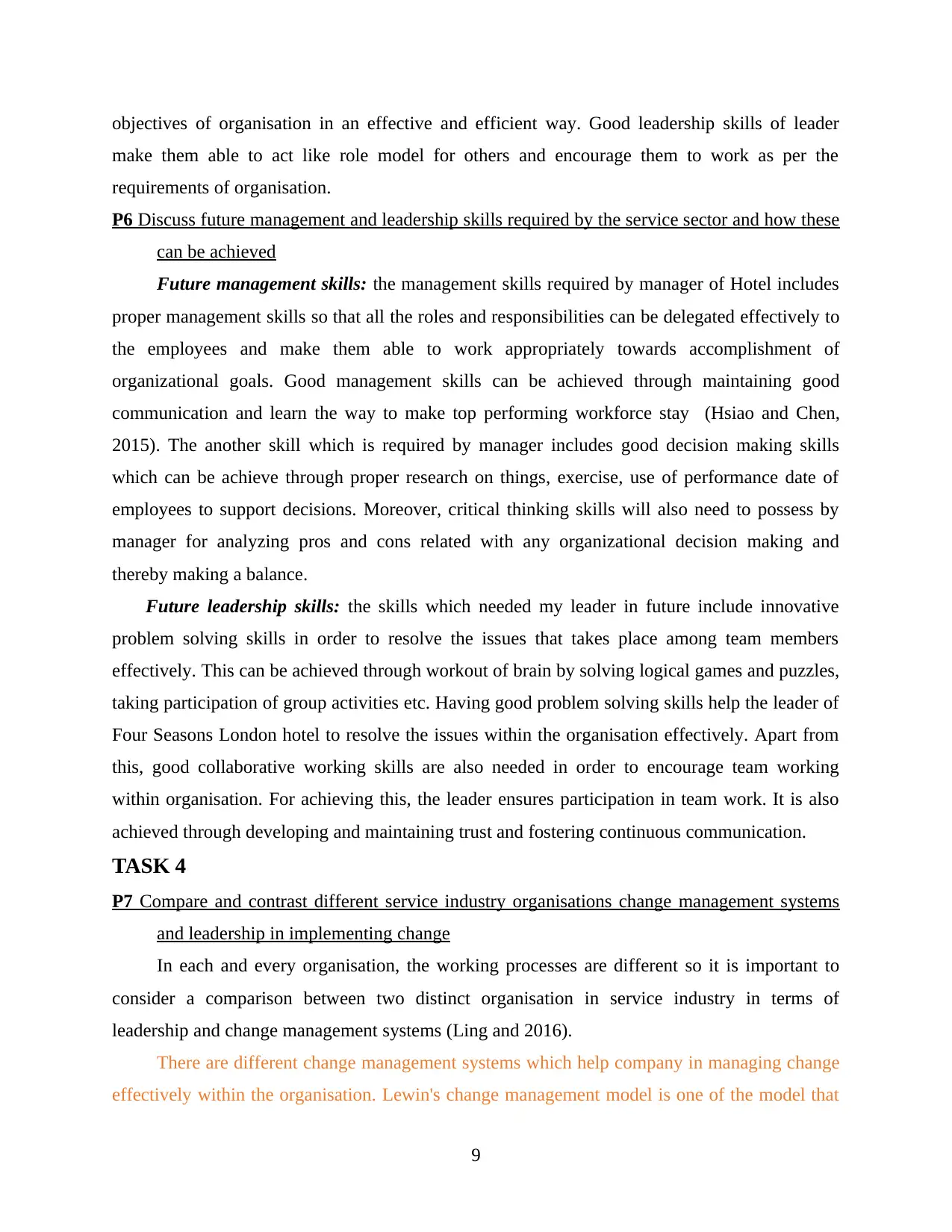
objectives of organisation in an effective and efficient way. Good leadership skills of leader
make them able to act like role model for others and encourage them to work as per the
requirements of organisation.
P6 Discuss future management and leadership skills required by the service sector and how these
can be achieved
Future management skills: the management skills required by manager of Hotel includes
proper management skills so that all the roles and responsibilities can be delegated effectively to
the employees and make them able to work appropriately towards accomplishment of
organizational goals. Good management skills can be achieved through maintaining good
communication and learn the way to make top performing workforce stay (Hsiao and Chen,
2015). The another skill which is required by manager includes good decision making skills
which can be achieve through proper research on things, exercise, use of performance date of
employees to support decisions. Moreover, critical thinking skills will also need to possess by
manager for analyzing pros and cons related with any organizational decision making and
thereby making a balance.
Future leadership skills: the skills which needed my leader in future include innovative
problem solving skills in order to resolve the issues that takes place among team members
effectively. This can be achieved through workout of brain by solving logical games and puzzles,
taking participation of group activities etc. Having good problem solving skills help the leader of
Four Seasons London hotel to resolve the issues within the organisation effectively. Apart from
this, good collaborative working skills are also needed in order to encourage team working
within organisation. For achieving this, the leader ensures participation in team work. It is also
achieved through developing and maintaining trust and fostering continuous communication.
TASK 4
P7 Compare and contrast different service industry organisations change management systems
and leadership in implementing change
In each and every organisation, the working processes are different so it is important to
consider a comparison between two distinct organisation in service industry in terms of
leadership and change management systems (Ling and 2016).
There are different change management systems which help company in managing change
effectively within the organisation. Lewin's change management model is one of the model that
9
make them able to act like role model for others and encourage them to work as per the
requirements of organisation.
P6 Discuss future management and leadership skills required by the service sector and how these
can be achieved
Future management skills: the management skills required by manager of Hotel includes
proper management skills so that all the roles and responsibilities can be delegated effectively to
the employees and make them able to work appropriately towards accomplishment of
organizational goals. Good management skills can be achieved through maintaining good
communication and learn the way to make top performing workforce stay (Hsiao and Chen,
2015). The another skill which is required by manager includes good decision making skills
which can be achieve through proper research on things, exercise, use of performance date of
employees to support decisions. Moreover, critical thinking skills will also need to possess by
manager for analyzing pros and cons related with any organizational decision making and
thereby making a balance.
Future leadership skills: the skills which needed my leader in future include innovative
problem solving skills in order to resolve the issues that takes place among team members
effectively. This can be achieved through workout of brain by solving logical games and puzzles,
taking participation of group activities etc. Having good problem solving skills help the leader of
Four Seasons London hotel to resolve the issues within the organisation effectively. Apart from
this, good collaborative working skills are also needed in order to encourage team working
within organisation. For achieving this, the leader ensures participation in team work. It is also
achieved through developing and maintaining trust and fostering continuous communication.
TASK 4
P7 Compare and contrast different service industry organisations change management systems
and leadership in implementing change
In each and every organisation, the working processes are different so it is important to
consider a comparison between two distinct organisation in service industry in terms of
leadership and change management systems (Ling and 2016).
There are different change management systems which help company in managing change
effectively within the organisation. Lewin's change management model is one of the model that
9
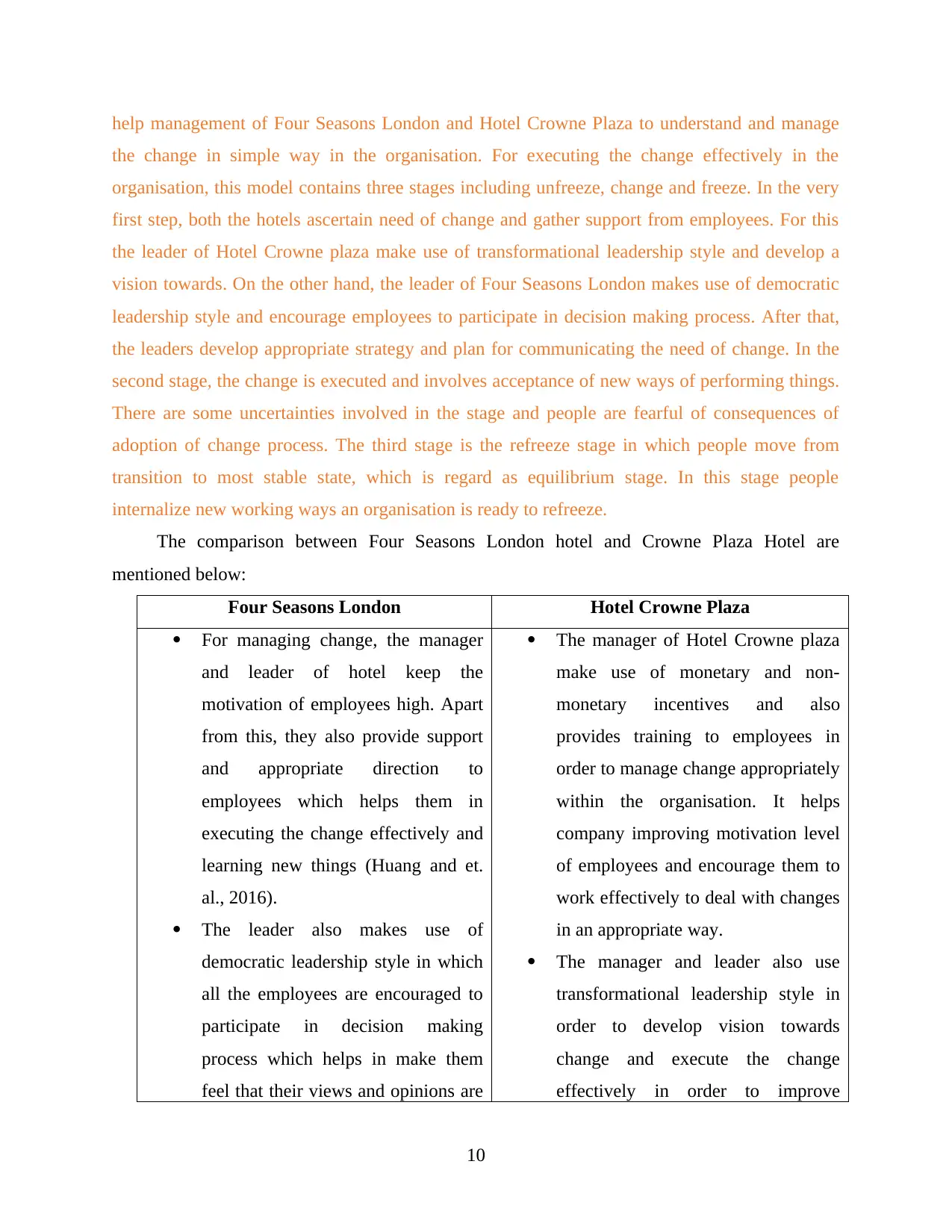
help management of Four Seasons London and Hotel Crowne Plaza to understand and manage
the change in simple way in the organisation. For executing the change effectively in the
organisation, this model contains three stages including unfreeze, change and freeze. In the very
first step, both the hotels ascertain need of change and gather support from employees. For this
the leader of Hotel Crowne plaza make use of transformational leadership style and develop a
vision towards. On the other hand, the leader of Four Seasons London makes use of democratic
leadership style and encourage employees to participate in decision making process. After that,
the leaders develop appropriate strategy and plan for communicating the need of change. In the
second stage, the change is executed and involves acceptance of new ways of performing things.
There are some uncertainties involved in the stage and people are fearful of consequences of
adoption of change process. The third stage is the refreeze stage in which people move from
transition to most stable state, which is regard as equilibrium stage. In this stage people
internalize new working ways an organisation is ready to refreeze.
The comparison between Four Seasons London hotel and Crowne Plaza Hotel are
mentioned below:
Four Seasons London Hotel Crowne Plaza
For managing change, the manager
and leader of hotel keep the
motivation of employees high. Apart
from this, they also provide support
and appropriate direction to
employees which helps them in
executing the change effectively and
learning new things (Huang and et.
al., 2016).
The leader also makes use of
democratic leadership style in which
all the employees are encouraged to
participate in decision making
process which helps in make them
feel that their views and opinions are
The manager of Hotel Crowne plaza
make use of monetary and non-
monetary incentives and also
provides training to employees in
order to manage change appropriately
within the organisation. It helps
company improving motivation level
of employees and encourage them to
work effectively to deal with changes
in an appropriate way.
The manager and leader also use
transformational leadership style in
order to develop vision towards
change and execute the change
effectively in order to improve
10
the change in simple way in the organisation. For executing the change effectively in the
organisation, this model contains three stages including unfreeze, change and freeze. In the very
first step, both the hotels ascertain need of change and gather support from employees. For this
the leader of Hotel Crowne plaza make use of transformational leadership style and develop a
vision towards. On the other hand, the leader of Four Seasons London makes use of democratic
leadership style and encourage employees to participate in decision making process. After that,
the leaders develop appropriate strategy and plan for communicating the need of change. In the
second stage, the change is executed and involves acceptance of new ways of performing things.
There are some uncertainties involved in the stage and people are fearful of consequences of
adoption of change process. The third stage is the refreeze stage in which people move from
transition to most stable state, which is regard as equilibrium stage. In this stage people
internalize new working ways an organisation is ready to refreeze.
The comparison between Four Seasons London hotel and Crowne Plaza Hotel are
mentioned below:
Four Seasons London Hotel Crowne Plaza
For managing change, the manager
and leader of hotel keep the
motivation of employees high. Apart
from this, they also provide support
and appropriate direction to
employees which helps them in
executing the change effectively and
learning new things (Huang and et.
al., 2016).
The leader also makes use of
democratic leadership style in which
all the employees are encouraged to
participate in decision making
process which helps in make them
feel that their views and opinions are
The manager of Hotel Crowne plaza
make use of monetary and non-
monetary incentives and also
provides training to employees in
order to manage change appropriately
within the organisation. It helps
company improving motivation level
of employees and encourage them to
work effectively to deal with changes
in an appropriate way.
The manager and leader also use
transformational leadership style in
order to develop vision towards
change and execute the change
effectively in order to improve
10
Secure Best Marks with AI Grader
Need help grading? Try our AI Grader for instant feedback on your assignments.
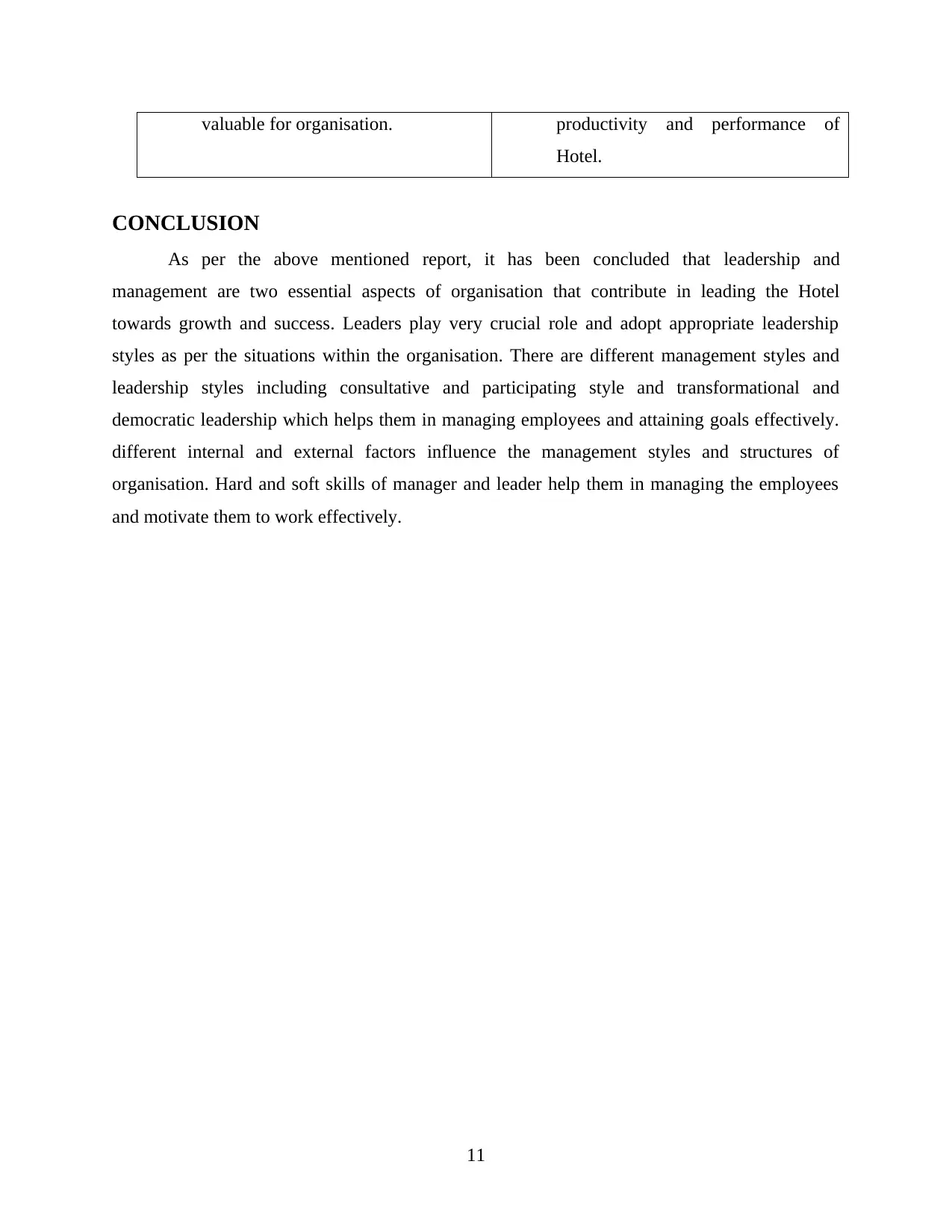
valuable for organisation. productivity and performance of
Hotel.
CONCLUSION
As per the above mentioned report, it has been concluded that leadership and
management are two essential aspects of organisation that contribute in leading the Hotel
towards growth and success. Leaders play very crucial role and adopt appropriate leadership
styles as per the situations within the organisation. There are different management styles and
leadership styles including consultative and participating style and transformational and
democratic leadership which helps them in managing employees and attaining goals effectively.
different internal and external factors influence the management styles and structures of
organisation. Hard and soft skills of manager and leader help them in managing the employees
and motivate them to work effectively.
11
Hotel.
CONCLUSION
As per the above mentioned report, it has been concluded that leadership and
management are two essential aspects of organisation that contribute in leading the Hotel
towards growth and success. Leaders play very crucial role and adopt appropriate leadership
styles as per the situations within the organisation. There are different management styles and
leadership styles including consultative and participating style and transformational and
democratic leadership which helps them in managing employees and attaining goals effectively.
different internal and external factors influence the management styles and structures of
organisation. Hard and soft skills of manager and leader help them in managing the employees
and motivate them to work effectively.
11
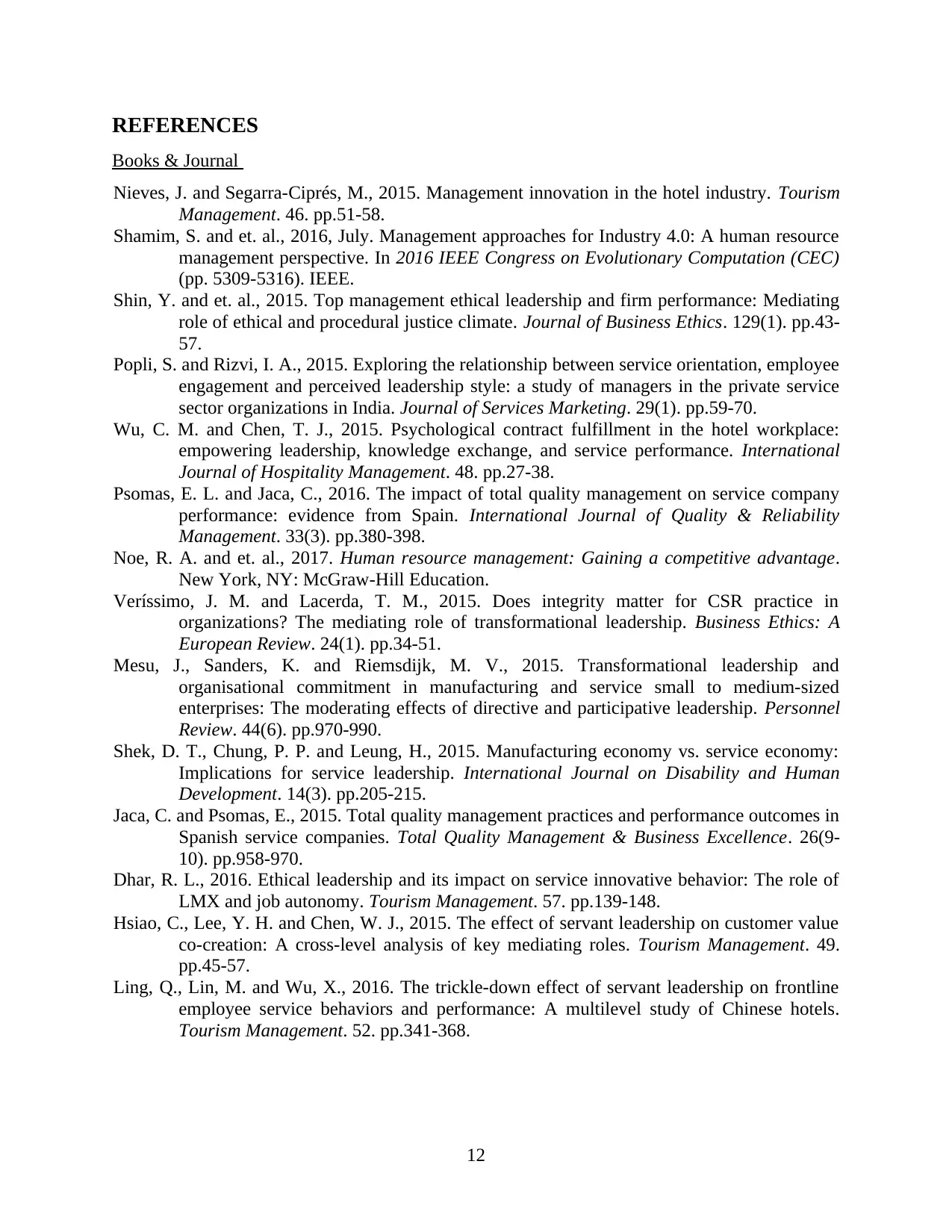
REFERENCES
Books & Journal
Nieves, J. and Segarra-Ciprés, M., 2015. Management innovation in the hotel industry. Tourism
Management. 46. pp.51-58.
Shamim, S. and et. al., 2016, July. Management approaches for Industry 4.0: A human resource
management perspective. In 2016 IEEE Congress on Evolutionary Computation (CEC)
(pp. 5309-5316). IEEE.
Shin, Y. and et. al., 2015. Top management ethical leadership and firm performance: Mediating
role of ethical and procedural justice climate. Journal of Business Ethics. 129(1). pp.43-
57.
Popli, S. and Rizvi, I. A., 2015. Exploring the relationship between service orientation, employee
engagement and perceived leadership style: a study of managers in the private service
sector organizations in India. Journal of Services Marketing. 29(1). pp.59-70.
Wu, C. M. and Chen, T. J., 2015. Psychological contract fulfillment in the hotel workplace:
empowering leadership, knowledge exchange, and service performance. International
Journal of Hospitality Management. 48. pp.27-38.
Psomas, E. L. and Jaca, C., 2016. The impact of total quality management on service company
performance: evidence from Spain. International Journal of Quality & Reliability
Management. 33(3). pp.380-398.
Noe, R. A. and et. al., 2017. Human resource management: Gaining a competitive advantage.
New York, NY: McGraw-Hill Education.
Veríssimo, J. M. and Lacerda, T. M., 2015. Does integrity matter for CSR practice in
organizations? The mediating role of transformational leadership. Business Ethics: A
European Review. 24(1). pp.34-51.
Mesu, J., Sanders, K. and Riemsdijk, M. V., 2015. Transformational leadership and
organisational commitment in manufacturing and service small to medium-sized
enterprises: The moderating effects of directive and participative leadership. Personnel
Review. 44(6). pp.970-990.
Shek, D. T., Chung, P. P. and Leung, H., 2015. Manufacturing economy vs. service economy:
Implications for service leadership. International Journal on Disability and Human
Development. 14(3). pp.205-215.
Jaca, C. and Psomas, E., 2015. Total quality management practices and performance outcomes in
Spanish service companies. Total Quality Management & Business Excellence. 26(9-
10). pp.958-970.
Dhar, R. L., 2016. Ethical leadership and its impact on service innovative behavior: The role of
LMX and job autonomy. Tourism Management. 57. pp.139-148.
Hsiao, C., Lee, Y. H. and Chen, W. J., 2015. The effect of servant leadership on customer value
co-creation: A cross-level analysis of key mediating roles. Tourism Management. 49.
pp.45-57.
Ling, Q., Lin, M. and Wu, X., 2016. The trickle-down effect of servant leadership on frontline
employee service behaviors and performance: A multilevel study of Chinese hotels.
Tourism Management. 52. pp.341-368.
12
Books & Journal
Nieves, J. and Segarra-Ciprés, M., 2015. Management innovation in the hotel industry. Tourism
Management. 46. pp.51-58.
Shamim, S. and et. al., 2016, July. Management approaches for Industry 4.0: A human resource
management perspective. In 2016 IEEE Congress on Evolutionary Computation (CEC)
(pp. 5309-5316). IEEE.
Shin, Y. and et. al., 2015. Top management ethical leadership and firm performance: Mediating
role of ethical and procedural justice climate. Journal of Business Ethics. 129(1). pp.43-
57.
Popli, S. and Rizvi, I. A., 2015. Exploring the relationship between service orientation, employee
engagement and perceived leadership style: a study of managers in the private service
sector organizations in India. Journal of Services Marketing. 29(1). pp.59-70.
Wu, C. M. and Chen, T. J., 2015. Psychological contract fulfillment in the hotel workplace:
empowering leadership, knowledge exchange, and service performance. International
Journal of Hospitality Management. 48. pp.27-38.
Psomas, E. L. and Jaca, C., 2016. The impact of total quality management on service company
performance: evidence from Spain. International Journal of Quality & Reliability
Management. 33(3). pp.380-398.
Noe, R. A. and et. al., 2017. Human resource management: Gaining a competitive advantage.
New York, NY: McGraw-Hill Education.
Veríssimo, J. M. and Lacerda, T. M., 2015. Does integrity matter for CSR practice in
organizations? The mediating role of transformational leadership. Business Ethics: A
European Review. 24(1). pp.34-51.
Mesu, J., Sanders, K. and Riemsdijk, M. V., 2015. Transformational leadership and
organisational commitment in manufacturing and service small to medium-sized
enterprises: The moderating effects of directive and participative leadership. Personnel
Review. 44(6). pp.970-990.
Shek, D. T., Chung, P. P. and Leung, H., 2015. Manufacturing economy vs. service economy:
Implications for service leadership. International Journal on Disability and Human
Development. 14(3). pp.205-215.
Jaca, C. and Psomas, E., 2015. Total quality management practices and performance outcomes in
Spanish service companies. Total Quality Management & Business Excellence. 26(9-
10). pp.958-970.
Dhar, R. L., 2016. Ethical leadership and its impact on service innovative behavior: The role of
LMX and job autonomy. Tourism Management. 57. pp.139-148.
Hsiao, C., Lee, Y. H. and Chen, W. J., 2015. The effect of servant leadership on customer value
co-creation: A cross-level analysis of key mediating roles. Tourism Management. 49.
pp.45-57.
Ling, Q., Lin, M. and Wu, X., 2016. The trickle-down effect of servant leadership on frontline
employee service behaviors and performance: A multilevel study of Chinese hotels.
Tourism Management. 52. pp.341-368.
12
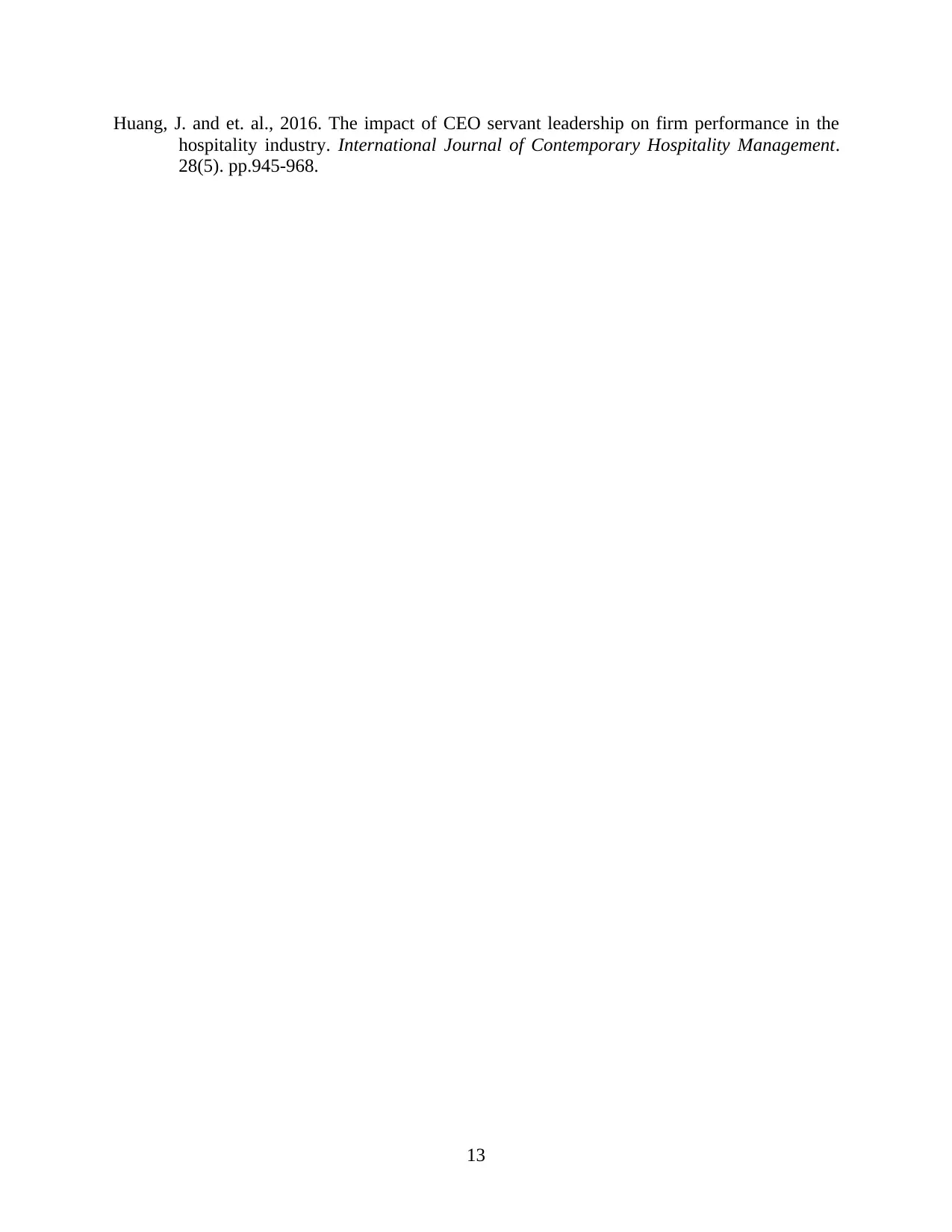
Huang, J. and et. al., 2016. The impact of CEO servant leadership on firm performance in the
hospitality industry. International Journal of Contemporary Hospitality Management.
28(5). pp.945-968.
13
hospitality industry. International Journal of Contemporary Hospitality Management.
28(5). pp.945-968.
13
1 out of 13
Related Documents
Your All-in-One AI-Powered Toolkit for Academic Success.
+13062052269
info@desklib.com
Available 24*7 on WhatsApp / Email
![[object Object]](/_next/static/media/star-bottom.7253800d.svg)
Unlock your academic potential
© 2024 | Zucol Services PVT LTD | All rights reserved.





